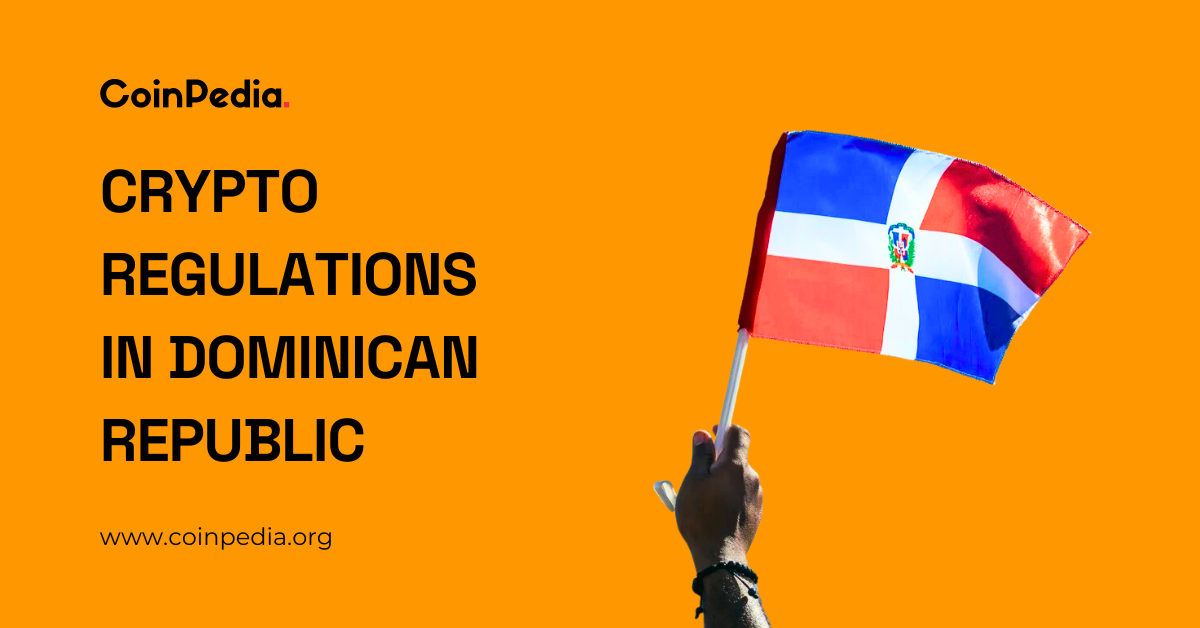Regulation
Cryptocurrency Regulations in the Dominican Republic 2024

The Dominican Republic, located on the Caribbean island of Hispaniola, is a nation renowned for its culture, landscape, and economy. In terms of population and area, it is the second largest in the Caribbean region. It has a population of over 11.4 million. Interestingly, out of these 11.4 million, as many as 3.6 million people live in its capital, Santo Domingo. It is worth noting that the country also has the largest economy in the region. It has experienced impressive growth over the past few decades. This growth has been driven by various key sectors like construction, manufacturing, tourism, and mining. But this does not mean that it is better than other Latin American countries. It also performs poorly in unemployment and income inequality, like similar Latin American economies. The biggest economic and political crisis it is currently facing is migration. Regardless, what forms the backbone of the Dominican Republic’s economy is its large diaspora in the United States, which contributes significantly to the economy in the form of foreign remittances. All of these factors make the country an ideal destination for introducing a crypto revolution. At the moment, the Dominican Republic’s crypto sector presents a mixed picture. The country has an active crypto community. But, from a regulatory perspective, the Central Bank of the Dominican Republic has been cautious. Recently, it has issued statements aimed at discouraging individuals and financial institutions from dealing with cryptocurrencies. According to the central bank’s position, cryptocurrencies are not backed by the government. Unfortunately, it has even threatened financial institutions with potential sanctions. Despite these reservations, there is something that keeps people’s hope alive. It is the support from the local community that the cryptocurrency sector is currently enjoying. According to a recent report, the local cryptocurrency market in the Dominican Republic continues to thrive, with an estimated turnover of over $12 million.
Interested in learning more about the cryptocurrency regulatory framework in the Dominican Republic? By the end of this session, you may have acquired everything you need to know about the country’s cryptocurrency regulatory landscape. Don’t hesitate to get started!
1. Cryptocurrency Regulation in the Dominican Republic: General Overview
Currently, cryptocurrency is a trending topic in the Dominican Republic. The Latin American country has recently seen a surge in the use of cryptocurrencies. According to a report published in 2022, usage increased by 52% that year, compared to the previous year. Clearly, the growing acceptance of the cryptocurrency sector among the country’s residents has yet to influence the government. The Dominican Republic has yet to create a regulatory framework to support the sector. Some of its recent actions have also been discouraging in nature. In 2021, the Central Bank of the Dominican Republic issued a statement against the use of cryptocurrencies. This statement was intended to warn users that cryptocurrencies are not legal tender. The lack of cryptocurrency regulation in the country creates legal gray areas. This raises the possibility of scams and illegal activities, including money laundering. Creating a proper cryptocurrency regulatory framework and educating its population about the risks and benefits of the cryptocurrency sector are the best things the Dominican Republic government can do right now for the advancement of its economy.
2. Cryptocurrency regulation in the Dominican Republic: what’s new
Here are some of the interesting developments that have occurred in the Web 3 sector in the Dominican Republic in the recent past.
October 11, 2023: The Central American Bank for Economic Integration and the Dominican Innovation Cabinet have developed an AI strategy. This is part of the National Innovation Policy 2030, which encourages research, public-private partnerships and talent development.
May 9, 2024: Banco Populaire trained 1,200 entrepreneurs and SMEs on AI opportunities in the Dominican Republic. The tenth edition of the forum registered 2,800 registrations, which shows a growing interest in Web 3 for companies.
July 8, 2024: The Dominican Republic ranks high in the Global Responsible AI Index, recognized for its ethical AI development by the Global AI Governance Center in South Africa.
3. Explanation of the tax framework for cryptocurrencies in the Dominican Republic
The fundamental principle of the Dominican Republic’s tax system is to find a balance between revenue needs and investment promotion. The country applies a territorial tax regime, which means that any income earned in the country is subject to tax.
Companies: are supposed to pay a local income tax rate of 27%.
Residents: face progressive tax rates of up to 25% on their local income.
Donations are taxed at 27% and inheritances at 3%. There is no wealth tax in the country.
For cryptocurrency users, the same principles apply, in the absence of a separate tax framework for cryptocurrencies. This means that if you earn income from crypto activities in the Dominican Republic, such as trading or mining, it falls under local-source income and is subject to the same tax rates.
4. Chronology of the evolution of cryptocurrency regulation in the Dominican Republic
Here’s how the country’s cryptocurrency regulatory framework has evolved.
1996: Ratified the Inter-American Convention against Corruption.
2002: Approved the United Nations Convention against Transnational Organized Crime and enacted legislation to combat money laundering.
2017: Implementation of the Anti-Money Laundering and Counter-Terrorism Financing Act, which modernized financial crime laws.
2021: The Central Bank has warned that cryptocurrencies are not government-backed assets or legal tender.
Endnote
In conclusion, creating a comprehensive regulatory framework for cryptocurrencies in the Dominican Republic is a challenging task. The ideal regulatory framework for the country will be one that strikes a balance between encouraging innovation and protecting users. Creating such a robust regulatory framework for cryptocurrencies essentially requires close collaboration between the government, financial institutions, and the crypto community. As the world is rapidly moving towards its digital future, it is best to achieve such collaboration sooner rather than later. Otherwise, the country risks missing its ticket to its digital economic future.
Read also : Cryptocurrency Regulation in Bolivia 2024
Regulation
Crypto community gets involved in anti-government protests in Nigeria

Amid the #EndBadGovernanceInNigeria protests in Nigeria, a notable shift is occurring within the country’s cryptocurrency sector. As the general public demands sweeping governance reforms, crypto community leaders are seizing the opportunity to advocate for specific regulatory changes.
Rume Ophi, former secretary of the Blockchain Stakeholders Association of Nigeria (SiBAN), stressed the critical need to integrate crypto-focused demands into the broader agenda of the protests.
Ophi explained the dual benefit of such requirements, noting that proper regulation can spur substantial economic growth by attracting investors and creating job opportunities. Ophi noted, “Including calls for favorable crypto regulations is not just about the crypto community; it’s about leveraging these technologies to foster broader economic prosperity.”
Existing government efforts
In opposition to Ophi’s call for action, Chimezie Chuta, chair of the National Blockchain Policy Steering Committee, presents a different view. He pointed out The Nigerian government continued efforts to nurture the blockchain and cryptocurrency industries.
According to Chuta, the creation of a steering committee was essential to effectively address the needs of the crypto community.
Chuta also highlighted the creation of a subcommittee to harmonize regulations for virtual asset service providers (VASPs). With the aim of streamlining operations and providing clear regulatory direction, the initiative involves cooperation with major organizations including the Securities and Exchange Commission (SEC) and the Central Bank of Nigeria (CBN). “Our efforts should mitigate the need for protest as substantial progress is being made to address the needs of the crypto industry,” Chuta said.
A united call for support
The ongoing dialogue between the crypto community and government agencies reflects a complex landscape of negotiations and demands for progress.
While actors like Ophi are calling for more direct action and the inclusion of crypto demands in protest agendas, government figures like Chuta are advocating for recognition of the steps already taken.
As protests continue, the crypto community’s push for regulatory reform highlights a crucial aspect of Nigeria’s broader fight to improve governance and economic policies. Both sides agree that favorable regulations are critical to the successful adoption and implementation of blockchain technologies, signaling a potentially transformative era for Nigeria’s economic framework.
Read also : OKX Exchange Exits Nigerian Market Amid Regulatory Crackdown
Regulation
Cryptocurrency Regulations in Slovenia 2024

Slovenia, a small but highly developed European country with a population of 2.1 million, boasts a rich industrial history that has contributed greatly to its strong economy. As the most economically developed Slavic nation, Slovenia has grown steadily since adopting the euro in 2007. Its openness to innovation has been a key factor in its success in the industrial sector, making it a prime destination for cryptocurrency enthusiasts. Many believe that Slovenia is poised to become a powerful fintech hub in Europe. But does its current regulatory framework for cryptocurrencies support such aspirations?
Let’s explore Slovenia’s cryptocurrency regulations and see if they can propel the country to the forefront of the cryptocurrency landscape. My expectations are positive. What are yours? Before we answer, let’s dig a little deeper.
1. Cryptocurrency regulation in Slovenia: an overview
Slovenia is renowned for its innovation-friendly stance, providing a supportive environment for emerging technologies such as blockchain and cryptocurrencies. Under the Payment Services and Systems Act, cryptocurrencies are classified as virtual assets rather than financial or monetary instruments.
The regulation of the cryptocurrency sector in Slovenia is decentralized. Different authorities manage different aspects of the ecosystem. For example, the Bank of Slovenia and the Securities Market Agency oversee cryptocurrency transactions to ensure compliance with financial laws, including anti-money laundering (AML) and terrorist financing regulations. The Slovenian Act on the Prevention of Money Laundering and Terrorist Financing (ZPPDFT-2) incorporates the EU’s 5th Anti-Money Laundering Directive (5MLD) and aligns with the latest FATF recommendations. All virtual currency service providers must register with the Office of the Republic of Slovenia.
2. Cryptocurrency regulation in Slovenia: what’s new?
Several notable developments have taken place this year in the cryptocurrency sector in Slovenia:
July 25, 2024:Slovenia has issued a €30 million on-chain digital sovereign bond, the first of its kind in the EU, with a yield of 3.65%, maturing on 25 November 2024.
May 14, 2024:NiceHash has announced the first Slovenian Bitcoin-focused conference, NiceHashX, scheduled for November 8-9 in Maribor.
3. Explanation of the tax framework for cryptocurrencies in Slovenia
The Slovenian cryptocurrency tax framework provides clear guidelines for individuals and businesses. According to the Slovenian Financial Administration, the tax treatment depends on the status of the trader and the nature of the transaction.
- People:Income earned from cryptocurrencies through employment or ongoing business activities is subject to personal income tax. However, capital gains from transactions or market fluctuations are exempt from tax.
- Companies:Capital gains from cryptocurrency-related activities are subject to a 19% corporate tax. Value-added tax (VAT) generally applies at a rate of 22%, although cryptocurrency transactions that are considered as means of payment are exempt from VAT. Companies are not allowed to limit payment methods to cryptocurrencies alone. Tokens issued during ICOs must follow standard accounting rules and corporate tax law.
4. Cryptocurrency Mining in Slovenia: What You Need to Know
Cryptocurrency mining is not restricted in Slovenia, but income from mining is considered business income and is therefore taxable. This includes rewards from validating transactions and any additional income from mining operations. Both individuals and legal entities must comply with Slovenian tax regulations.
5. Timeline of the development of cryptocurrency regulation in Slovenia
Here is a timeline highlighting the evolution of cryptocurrency regulations in Slovenia:
- 2013:The Slovenian Financial Administration has issued guidelines stating that income from cryptocurrency transactions should be taxed.
- 2017:The Slovenian Financial Administration has provided more detailed guidelines on cryptocurrency taxation, depending on factors such as the status of the trader and the type of transaction.
- 2023:The EU adopted the Markets in Crypto-Assets (MiCA) Regulation, establishing a uniform regulatory framework for crypto-assets, their issuers and service providers across the EU.
Endnote
Slovenia’s approach to the cryptocurrency sector is commendable, reflecting its optimistic view of the future of cryptocurrencies. The country’s balanced regulatory framework supports cryptocurrency innovation while protecting users’ rights and preventing illegal activities. Recent developments demonstrate Slovenia’s commitment to continually improving its regulatory environment. Slovenia’s cryptocurrency regulatory framework sets a positive example for other nations navigating the evolving cryptocurrency landscape.
Read also : Hong Kong Cryptocurrency Regulations 2024
Regulation
A Blank Sheet for Cryptocurrencies: Kamala Harris’ Regulatory Opportunity

photo by Shubham Dhage on Unsplash
As the cryptocurrency landscape continues to evolve, the need for clear regulation has never been more pressing.
With Vice President Kamala Harris now leading the charge on digital asset regulation in the United States, this represents a unique opportunity to start fresh. This fresh start can foster innovation and protect consumers. It can also pave the way for widespread adoption across industries, including real estate agencies, healthcare providers, and online gaming platforms like these. online casinos ukAccording to experts at SafestCasinoSites, these platforms come with benefits such as bonus offers, a wide selection of games, and various payment methods. Ultimately, all this increase in adoption could propel the cryptocurrency market forward.
With this in mind, let’s look at the current state of cryptocurrency regulation in the United States, a complex and confusing landscape. Multiple agencies, including the Securities and Exchange Commission (SEC), the Commodity Futures Trading Commission (CFTC), and the Financial Crimes Enforcement Network (FinCEN), have overlapping jurisdictions, creating a fragmented regulatory environment. This lack of clarity has stifled innovation as companies are reluctant to invest in the United States, fearing regulatory repercussions. A coherent and clear regulatory framework is urgently needed to realize the full potential of cryptocurrencies in the United States.
While the US struggles to find its footing, other countries, such as Singapore and the UK, are actively looking into the cryptocurrency sector by adopting clear and supportive regulatory frameworks. This has led to a brain drain, with companies choosing to locate in more conducive environments.
Vice President Kamala Harris has a unique opportunity to change that narrative and start over. Regulation of cryptocurrencies. By taking a comprehensive and inclusive approach, it can help create a framework that balances consumer protection with innovation and growth. The time has come for clear and effective regulation of cryptocurrencies in the United States.
Effective regulation of digital assets is essential to foster a safe and innovative environment. The key principles guiding this regulation are clarity, innovation, global cooperation, consumer protection, and flexibility. Clear definitions and guidelines eliminate ambiguity while encouraging experimentation and development to ensure progress. Collaboration with international partners establishes consistent standards, preventing regulatory arbitrage. Strong safeguards protect consumers from fraud and market abuse, and adaptability allows for evolution in response to emerging trends and technologies, striking a balance between innovation and protection.
The benefits of effective cryptocurrency regulation are multiple and far-reaching. By establishing clear guidelines, governments can attract investors and mainstream users, driving growth and adoption. This can, in turn, position countries like the United States as global leaders in fintech and innovation. Strong safeguards will also increase consumer confidence in digital assets and related products, increasing economic activity.
A thriving crypto industry can contribute significantly to GDP and job creation, which has a positive impact on the overall economy. Furthermore, effective regulation has paved the way for the growth of many businesses such as tech startups, online casinos, and pharmaceutical companies, demonstrating that clear guidelines can open up new opportunities without stifling innovation. This is a great example of how regulation can allay fears of regressive policies, even if Kamala Harris does not repeal the current progressive approach. By adopting effective regulation, governments can create fertile ground for the crypto industry to thrive, thereby promoting progress and prosperity.
Regulation
South Korea Imposes New ‘Monitoring’ Fees on Cryptocurrency Exchanges

Big news! The latest regulatory changes in South Korea are expected to impact major cryptocurrency exchanges like Upbit and Bithumb. Under the updated regulations, these platforms will now have to pay monitoring fees, which could cause problems for some exchanges.
Overview of new fees
In the latest move to regulate cryptocurrencies, the Financial Services Commission announced on July 1 the revised “Enforcement Order of the Act on the Establishment of the Financial Services Commission, etc.” update “Regulations on the collection of contributions from financial institutions, etc.” According to local legislation newsThe regulations require virtual asset operators to pay supervisory fees for inspections conducted by the Financial Supervisory Service starting next year. The total fees for the four major exchanges are estimated at around 300 million won, or about $220,000.
Apportionment of costs
Upbit, which holds a dominant market share, is expected to bear more than 90% of the total fee, or about 272 million won ($199,592) based on its operating revenue. Bithumb will pay about 21.14 million won ($155,157), while Coinone and GOPAX will contribute about 6.03 million won ($4,422) and 830,000 won ($608), respectively. Korbit is excluded from this fee due to its lower operating revenue.
Impact on the industry
The supervision fee will function similarly to a quasi-tax for financial institutions subject to inspections by the Financial Supervisory Service. The new law requires any company with a turnover of 3 billion won or more to pay the fee.
In the past, fees for electronic financial companies and P2P investment firms were phased in over three years. However, the taxation of virtual asset operators has been accelerated, reflecting the rapid growth of the cryptocurrency market and increasing regulatory scrutiny.
Industry reactions
The rapid introduction of the fee was unexpected by some industry players, who had expected a delay. Financial Supervisory Service officials justified the decision by citing the creation of the body concerned and the costs already incurred.
While larger exchanges like Upbit and Bithumb can afford the cost, smaller exchanges like Coinone and GOPAX, which are currently operating at a loss, could face an additional financial burden. This is part of a broader trend of declining trading volumes for South Korean exchanges, which have seen a 30% drop since the new law went into effect.
-

 Regulation11 months ago
Regulation11 months agoRipple CTO and Cardano founder clash over XRP’s regulatory challenges ⋆ ZyCrypto
-

 Regulation10 months ago
Regulation10 months agoNancy Pelosi Considers Supporting Republican Crypto Bill FIT21 – London Business News
-

 Videos11 months ago
Videos11 months agoCryptocurrency News: Bitcoin, ETH ETF, AI Crypto Rally, AKT, TON & MORE!!
-

 Regulation11 months ago
Regulation11 months agoBitcoin’s future is ‘bleak’ and ripe for regulation, says lead developer
-

 News8 months ago
News8 months agoAave Price Increases Following Whales Accumulation and V3.1 Launch
-

 Regulation8 months ago
Regulation8 months agoSouth Korea Imposes New ‘Monitoring’ Fees on Cryptocurrency Exchanges
-

 Regulation8 months ago
Regulation8 months agoA Blank Sheet for Cryptocurrencies: Kamala Harris’ Regulatory Opportunity
-

 Regulation8 months ago
Regulation8 months agoCryptocurrency Regulations in Slovenia 2024
-

 News11 months ago
News11 months agoThe trader earned $46 million with PEPE after reaching a new ATH
-

 Regulation10 months ago
Regulation10 months agoCrypto needs regulation to thrive: Tyler Cowen
-

 Blockchain11 months ago
Blockchain11 months agoSolana ranks the fastest blockchain in the world, surpassing Ethereum, Polygon ⋆ ZyCrypto
-

 Blockchain10 months ago
Blockchain10 months agoSolana Surpasses Ethereum and Polygon as the Fastest Blockchain ⋆ ZyCrypto













